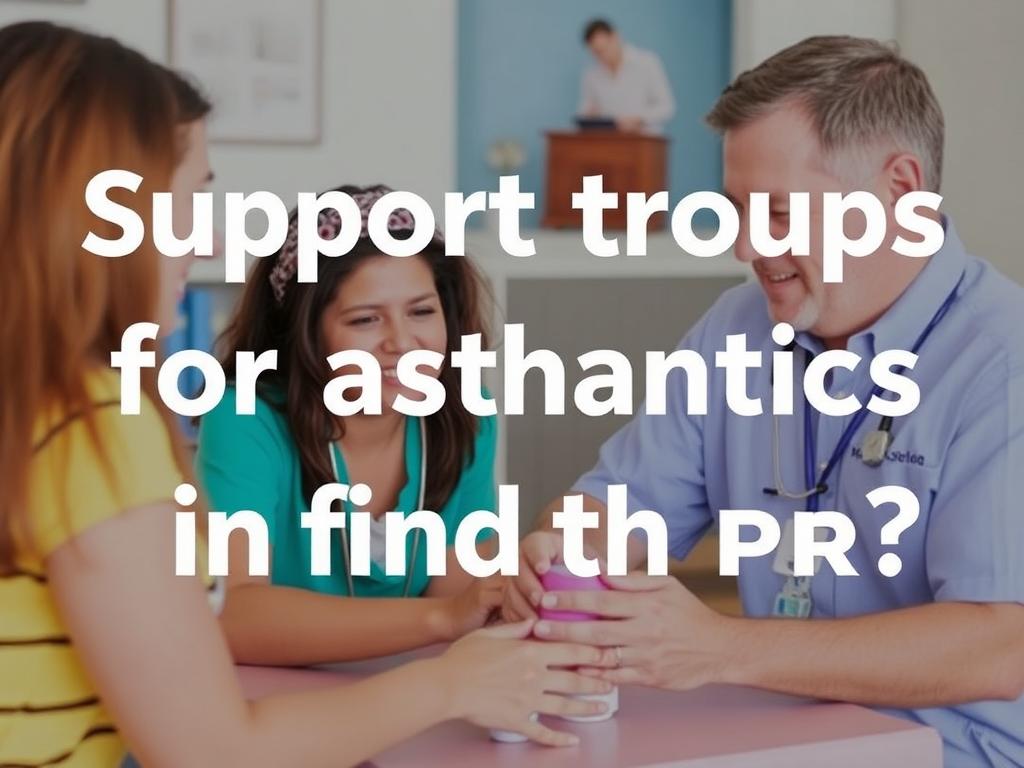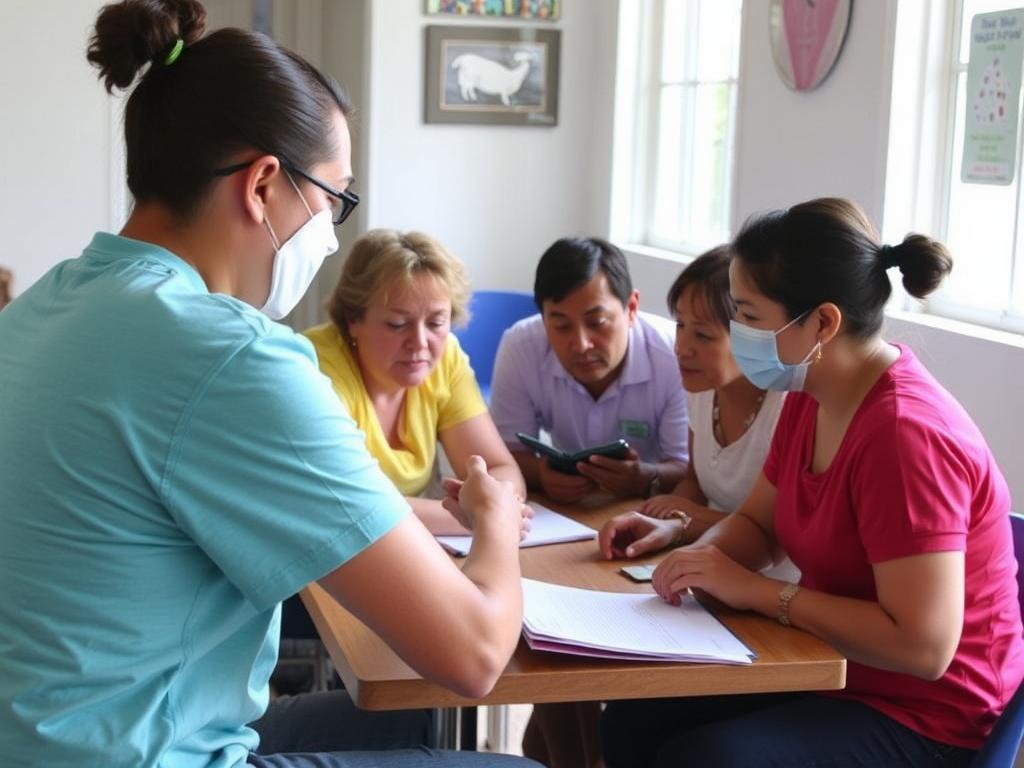Living with asthma can be challenging, especially when you feel like you are facing it alone. For many people in Puerto Rico (PR), managing asthma involves more than just medication—it requires emotional support, education, and a community that understands what you are going through. Thankfully, there are many grupos de apoyo para asmáticos en PR that provide exactly this. These groups are invaluable resources for anyone diagnosed with asthma, their families, and caregivers. In this article, we’ll explore where to find these support groups in Puerto Rico, what they offer, and why being part of one can truly make a difference in your asthma journey.
Understanding the Importance of Asthma Support Groups
Asthma is a chronic respiratory condition that affects thousands of people in Puerto Rico. The island’s unique climate and urban environment can sometimes make symptoms worse, and access to information and resources is key to managing the disease effectively. Joining a grupo de apoyo para asmáticos en PR means gaining a circle of people who share your experiences. These groups provide emotional support, practical advice, and often opportunities to learn directly from healthcare professionals.
For many, asthma can trigger feelings of isolation or anxiety. Support groups create safe spaces where members can openly discuss their concerns without judgment. Whether it’s tips on controlling asthma triggers, understanding medication plans, or how to handle asthma attacks, the knowledge exchanged within these communities can empower patients to take control of their health.
Where to Find Grupos de Apoyo para Asmáticos en PR
Finding the right asthma support group in Puerto Rico is easier than you might think. Various organizations—both governmental and non-governmental—have established networks to assist patients across the island.
1. Local Hospitals and Clinics
Many hospitals in Puerto Rico have asthma education programs that include regular support group meetings. For instance:
| Hospital/Clinic | Location | Type of Support Offered |
|---|---|---|
| Hospital Auxilio Mutuo | San Juan | Asthma education, group counseling, family sessions |
| Centro Médico de Puerto Rico | San Juan | Support groups led by respiratory therapists, workshops |
| Hospital San Lucas | Ponce | Monthly peer support meetings, asthma control strategies |
Patients can ask their pulmonologists or primary care providers about these groups to get connected.
2. Nonprofit Organizations and Foundations
Various nonprofits focus on respiratory health and have active asthma support programs throughout Puerto Rico. These organizations often hold community outreach events, educational seminars, and ongoing support group meetings:
- Asma de Puerto Rico, Inc. — This foundation is dedicated to asthma awareness and education, offering monthly support group gatherings and virtual meetings to reach people in remote areas.
- Fundación de Pacientes con Asma — With a focus on patient empowerment, this group provides resources, educational materials, and personalized counseling.
- American Lung Association of Puerto Rico — Although a branch of a US-based organization, they host various programs specifically tailored for Puerto Rican communities, including group workshops and asthma action plan assistance.
3. Online Support Groups and Social Media Communities
In today’s digital age, finding support online has become easier than ever, especially if mobility or time constraints limit in-person attendance. There are several Facebook groups and WhatsApp chat groups dedicated to asthma support in Puerto Rico, where members share experiences, advice, and encouragement 24/7. Some key online communities are moderated by healthcare professionals to ensure accurate information is shared.
What to Expect from an Asthma Support Group in PR

When you join a grupo de apoyo para asmáticos en PR, you might wonder what the meetings involve and how they can help you. Here’s a closer look at some common features:
Educational Sessions
Many support groups organize workshops or presentations on topics like:
- Identifying and avoiding asthma triggers common in Puerto Rico
- Proper medication use and inhaler techniques
- Latest asthma treatment options
- Emergency response and asthma action plans
These sessions often include Q&A periods, allowing attendees to seek clarification on their personal concerns.
Emotional Support and Shared Experiences
Beyond education, these groups provide a venue for sharing personal stories. Talking about your asthma journey with others who understand can reduce feelings of depression and anxiety related to chronic illness. Participants often find new friends and cheerleaders who motivate them to adhere to treatment plans and live healthy lifestyles.
Family Participation
Asthma doesn’t just affect the person diagnosed—it impacts family members too. Many Puerto Rican groups encourage family involvement, teaching parents, siblings, and caretakers how to best support their loved ones. This holistic approach improves overall asthma management for the entire household.
Additional Resources for Asthma Patients in Puerto Rico

While grupos de apoyo para asmáticos en PR are fundamental, there are also other resources that complement their work. It’s important to stay informed and engaged through multiple channels:
Government Health Programs
The Puerto Rico Department of Health provides asthma-related programs, including screening events and free inhaler distribution in some cases. Their website and local health offices offer brochures and contact information for respiratory health services.
Pharmacies and Community Health Centers
Many pharmacies in Puerto Rico offer asthma education services or can guide you toward local support groups. Community health centers are also a good place to ask about support networks or asthma workshops.
Schools and Universities
Some educational institutions host asthma awareness days or have student-led health organizations supporting people with chronic diseases. These can be particularly helpful for younger patients or university students managing asthma while studying.
Tips for Getting the Most Out of a Support Group
Joining a grupo de apoyo para asmáticos en PR is a great step, but to truly benefit, here are a few tips:
- Be open and honest: Sharing your experiences can help you and others; it’s okay to be vulnerable.
- Ask questions: Don’t hesitate to clarify anything confusing about your condition or treatment.
- Take notes: Information from group meetings can be valuable later on.
- Try multiple groups: If the first group you join doesn’t feel like a good fit, there are others that may suit your needs better.
- Stay consistent: Regular attendance helps build relationships and deepen your understanding.
Challenges Faced by Asthma Patients in Puerto Rico and How Support Groups Help
Asthma patients in Puerto Rico face unique challenges. The island’s tropical climate, with its combination of humidity, pollen, dust mites, and occasional mold from heavy rain, can intensify asthma symptoms. Adding to this are environmental factors like traffic pollution in urban areas and limited access to specialist care in rural regions. Economic factors sometimes prevent consistent medication use, and during natural disasters like hurricanes, disruption to healthcare services can worsen outcomes.
Grupos de apoyo para asmáticos en PR help address these challenges by:
- Providing coping strategies to handle environmental triggers
- Helping patients navigate healthcare systems to access medicines and specialists
- Offering psychosocial support during emergencies or difficult times
- Raising awareness among the wider community to improve asthma-friendly policies
Success Stories: How Support Groups Have Changed Lives in Puerto Rico
The positive impact of support groups extends beyond individual health. Many patients report improved asthma control, fewer hospitalizations, and better quality of life after joining a grupo de apoyo para asmáticos en PR. For example, Maria, a mother of two from Bayamón, credits her local support group for teaching her how to recognize early warning signs of asthma attacks in her children and how to implement an effective action plan. Juan, a young adult in San Juan, found motivation through his group to quit smoking—a major asthma aggravator—and has maintained lung function improvement ever since.
These transformations reflect the power of community and education working hand in hand.
How to Start Your Own Asthma Support Group in Puerto Rico
If you can’t find an existing group near you, or you want to create a network tailored to a specific community, starting your own grupo de apoyo para asmáticos en PR is possible. Here are some steps to help:
| Step | Description |
|---|---|
| 1. Connect with healthcare professionals | Reach out to local doctors, nurses, or respiratory therapists who can assist with educational content. |
| 2. Find a meeting place | Community centers, churches, clinics, or libraries often offer spaces for free or low cost. |
| 3. Promote the group | Use social media, flyers in clinics, and word of mouth to attract participants. |
| 4. Schedule regular meetings | Consistency helps members build trust and stay engaged. |
| 5. Seek funding or donations | Nonprofits or local businesses may support your cause financially or with supplies. |
| 6. Keep sessions interactive and informative | Include talks, group discussions, and activities that foster learning and solidarity. |
Starting your own support group not only helps you but can become a vital resource for many others.
Language and Cultural Considerations in Asthma Support
In Puerto Rico, the primary language is Spanish, and asthma support groups reflect this cultural reality. Conducting groups in Spanish ensures clear communication and comfort for participants. Additionally, many groups incorporate Puerto Rican cultural values such as familismo—the prioritization of family—and personalismo, which emphasizes warm, personal relationships. These aspects create an environment where members genuinely feel cared for and understood.
Understanding cultural attitudes toward health and chronic illness helps facilitators tailor messages, making asthma education more effective and support more meaningful.
Asthma Myths and Facts in Puerto Rico
Support groups also serve as places to debunk common myths that may prevent proper asthma management. Here are examples often discussed:
| Myth | Fact |
|---|---|
| Asthma only occurs in children. | Asthma can begin at any age and continue throughout adulthood. |
| Inhalers are addictive. | Inhalers deliver medication to manage asthma and are not addictive. |
| You should avoid exercise if you have asthma. | With proper management, exercise is beneficial and encouraged. |
| Asthma symptoms will go away on their own. | Asthma requires ongoing management and should not be ignored. |
Correcting these misunderstandings can empower patients to adhere to treatment plans and lead healthier lives.
Innovations in Asthma Support in Puerto Rico
Recently, some groups in Puerto Rico have been incorporating technology to expand their reach and enhance support. Mobile apps tailored for asthma management, telehealth consultations, and interactive webinars are becoming more common. These tools help patients track symptoms, remind them to take medications, and connect with specialists from home. Combining these digital resources with traditional support groups creates a hybrid model that offers flexibility and accessibility.
Frequently Asked Questions about Grupos de Apoyo para Asmáticos en Puerto Rico

- Who can join asthma support groups? Anyone diagnosed with asthma, family members, caregivers, or individuals interested in learning about asthma can participate.
- Are these groups free? Most grupos de apoyo para asmáticos en PR are free or have minimal costs. Some nonprofits may request small donations to cover expenses.
- Do I have to speak Spanish to join? Most groups are in Spanish, but some bilingual groups exist, especially in urban areas like San Juan.
- How often do support groups meet? Meeting frequency varies but commonly ranges from monthly to biweekly sessions.
Building a Community of Strength
Living with asthma in Puerto Rico can be a complex challenge, but you are not alone. The growing network of grupos de apoyo para asmáticos en PR offers a path forward, blending education, emotional support, and community. Whether you join an established support group or start your own, you will find others walking the same path, ready to share knowledge and encouragement. In this sense, these groups aren’t just about asthma—they’re about building resilience and improving quality of life, one breath at a time.
Conclusion
Grupos de apoyo para asmáticos en PR are vital resources that do more than just provide information—they offer hope, friendship, and practical tools to manage a chronic condition in a supportive environment. Puerto Rico’s diverse options—from hospital programs to nonprofits and online communities—make it accessible for anyone seeking connection and assistance. By participating in these groups, asthma patients and their families can navigate the complexities of the disease together, confront unique challenges posed by the island’s environment and healthcare system, and ultimately lead healthier, fuller lives. If you or a loved one struggle with asthma, consider reaching out to one of these groups, because managing asthma is not just about medication—it’s about community.
